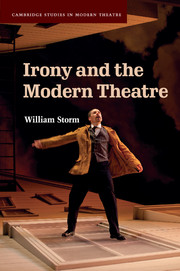Book contents
- Frontmatter
- Contents
- Acknowledgements
- Introduction
- 1 Irony personified: Ibsen and The Master Builder
- 2 The character of irony in Chekhov
- 3 Irony and dialectic: Shaw's Candida
- 4 Pirandello's “Father” – and Brecht's “Mother”
- 5 Absurdist irony: Ionesco's “anti-play”
- 6 “Ironist First Class”: Stoppard's Arcadia
- 7 American ironies: Wasserstein and Kushner
- 8 Irony's theatre
- Notes
- Works cited
- Index
6 - “Ironist First Class”: Stoppard's Arcadia
Published online by Cambridge University Press: 01 June 2011
- Frontmatter
- Contents
- Acknowledgements
- Introduction
- 1 Irony personified: Ibsen and The Master Builder
- 2 The character of irony in Chekhov
- 3 Irony and dialectic: Shaw's Candida
- 4 Pirandello's “Father” – and Brecht's “Mother”
- 5 Absurdist irony: Ionesco's “anti-play”
- 6 “Ironist First Class”: Stoppard's Arcadia
- 7 American ironies: Wasserstein and Kushner
- 8 Irony's theatre
- Notes
- Works cited
- Index
Summary
If there is a rival, or perhaps an heir, to Bernard Shaw as “archparadoxist” it is most assuredly Tom Stoppard, especially in the realms of verbal and situational irony. In Stoppard's Arcadia, the figure of Septimus Hodge, the tutor-turned-hermit, provides one of the most intricate and layered embodiments of Stoppard's renowned tendency toward irony in the form of paradox, witticism, literary allusion, and historical juxtaposition. Stoppard has been called an “Ironist First Class”; his fondness for paradox and tautology is familiar, well-documented, and repeatedly in evidence in his plays; his habitual fondness for literary references (writers and their works alike) and situational quirks in history is amply demonstrated. Remarking on the dramatist's style of dialogue, Stephen Schiff points to Stoppard's “paradox-happy logorrhea,” and the playwright himself confesses that paradox and tautology “don't have to mean anything, lead anywhere, be part of anything else. I just like them. I've got an unhealthy love affair for them” (155, 215).
In the play that first brought Stoppard notoriety, Rosencrantz and Guildenstern are Dead (1966), the master irony is based on an inversion of focus with regard to Hamlet, one that brings Shakespeare's two doomed courtiers, insignificant in the tragedy's action, to the forefront in both philosophic and dramatic terms. The two are assigned prominence, in Stoppard's telling, by the very fact that they are so unaware of their purpose or place in the cosmic scheme of events, or in the plot that has allowed them to exist in the first place.
- Type
- Chapter
- Information
- Irony and the Modern Theatre , pp. 153 - 179Publisher: Cambridge University PressPrint publication year: 2011



